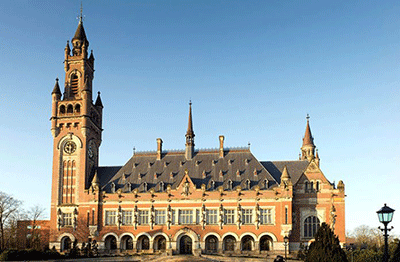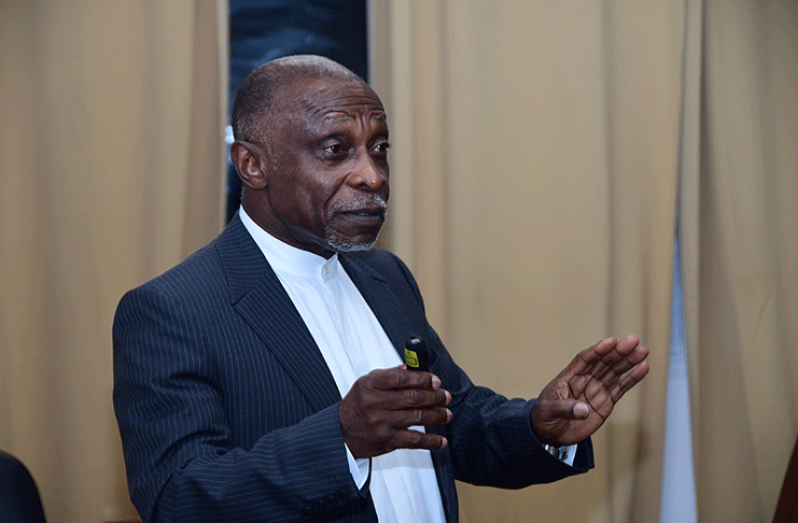…country has up to November 28 to decide if it will contest border controversy court case
VENEZUELA has 10 days left to inform the International Court of Justice (ICJ) on its participation in the oral arguments on whether the court has jurisdiction to hear the case filed by Guyana – Arbitral Award of 1899 (Guyana v Venezuela).
Guyana’s Foreign Secretary Carl Greenidge made the disclosure while lecturing on the Guyana-Venezuela Controversy at the University of Guyana, Turkeyen Campus recently. In his in-depth presentation to the law students, the foreign secretary said Venezuela has until Thursday, November 28, 2019, to inform the ICJ whether or not it will be putting forward oral arguments on the court’s jurisdiction to adjudicate the matter.

The oral hearings will be held in The Hague from March 23-27, 2020. The hearing will determine whether the court has jurisdiction over the case filed by Guyana on March 29, 2018. By that case, Guyana seeks to obtain from the court a final and binding judgement that the 1899 Arbitral Award, which established the location of the land boundary between then British Guiana and Venezuela, remains valid and binding, and that Guyana’s Essequibo region belongs to Guyana, and not Venezuela.
Contending that the ICJ lacks jurisdiction to adjudicate in the matter, Venezuela has failed to submit its Counter-Memorial on Jurisdiction – in response to Guyana’s Memorial on April 18, 2019 – a date which was fixed by the court. Nonetheless, the Spanish-speaking country still has an opportunity to contribute to the process, but it must indicate its willingness to do so by November 28.
The foreign secretary said if Venezuela indicates to the ICJ that it will not submit oral arguments, the case will go on unhindered. “Whether or not Venezuela participates, I wouldn’t put it as being immaterial, but it does not frustrate the work of the court. The work of the court will proceed, whether or not they participate,” Greenidge told the law students in his guest lecture.

Greenidge’s position is one held by the ICJ. According to the international court, if there are preliminary objections challenging its competence to decide on the merits of the case on the basis that it lacks jurisdiction or the application is inadmissible, it has the responsibility to decide on the way forward. “Failure by one party to appear does not prevent the proceedings from taking their course, although the court must first satisfy itself that it has jurisdiction,” the ICJ explained.
Greenidge told the students that the Government of Guyana is confident of a win against Venezuela in both cases – the jurisdictional matter and the substantive matter treating with the validity of the Arbitral Award of 1899.
In its Memorial on Jurisdiction last November, the Guyana Government argued that Venezuela’s contention that the means of settlement outlined in Article 33 of the UN Charter must be exhausted before recourse to the court can be chosen is baseless. It maintained that nothing in the text of Article IV of the Geneva Agreement, which provides a menu of options, supports Venezuela’s interpretation.
“Nor is Venezuela correct in arguing that, as it has recently asserted, the controversy must be resolved exclusively by friendly negotiations, a claim that is belied by the express terms of the Geneva Agreement and contemporaneous statements by the parties during its negotiation and ratification,” the Foreign Ministry had pointed out.
Guyana was keen on pointing out that for efforts over more than half-a-century, including a four-year Mixed Commission (1966-1970), a 12-year moratorium (1970-1982), a seven-year process of consultations on a means of settlement (1983-1990), and a 27-year Good Offices Process under the UN Secretary-General’s authority (1990-2017), all have failed to end the controversy.
In putting the case into context, the foreign secretary explained that after an international panel issued the 1899 Arbitral Award, Venezuela and Britain demarcated British Guiana’s border with Venezuela. He said though both Venezuela and Britain had accepted the Arbitral Award in 1899, Venezuela, some 63 years later, rejected the award. On February 17, 1966, the Geneva Agreement was signed by the Government of the United Kingdom of Great Britain and Northern Ireland and the Government of Venezuela, thereby establishing a Mixed Commission with the task of seeking satisfactory solutions for settlement of the border controversy. He noted that Guyana gained independence in May 1966 with Essequibo an integral part of the state.
In alluding to the Geneva Agreement, Greenidge was keen on pointing out Article IV. A section of that article states: “If the means so chosen do not lead to a solution of the controversy, the said organ or, as the case may be, the Secretary-General of the United Nations shall choose another of the means stipulated in Article 33 of the Charter of the United Nations, and so on until the controversy has been resolved, or until all the means of peaceful settlement there contemplated have been exhausted.”
Article 33 of the UN Charter provides a menu of options among them negotiation, enquiry, mediation, conciliation, arbitration and judicial settlement.
The foreign secretary said it was on the basis of the Geneva Agreement that the controversy was referred to the ICJ by the UN Secretary-General Antonio Gutteres in January 2018 after the Good Offices Process had proven to be unsuccessful. The matter was referred to the ICJ, approximately three years after a request was made by Guyana.
The foreign secretary recalled that it was in September 2015, that President David Granger called upon the then UN Secretary-General Ban Ki moon to have Venezuela’s contention that the Arbitral Award of 1899 is “null and void” settled with finality by judicial process, as per the Geneva Agreement.
Greenidge said Guyana had argued then and its position remains the same today, that Venezuela has a legal contention – “one eminently suited to resolution by the world’s highest juridical body.” In response, the then UN Secretary-General in November, 2015 proposed “The Way Forward,” Greenidge told the students, explaining that it was intended that the two countries would have engaged in a final 12-month continuation of the Good Offices Process.
He noted that on December 12, 2016, in conjunction with his successor, the then Secretary-General designate, Antonio Guterres and the secretary-general decided that the Good Offices Process would have continued with a strengthened mandate of mediation for one final year. But by the end of 2017, the UN Secretary-General concluded that significant progress had not been made toward arriving at a full agreement for the solution of the controversy. It was thereafter, in January 2018, that the controversy was referred to the ICJ by Guterres.
“Given the failure, since independence of the means of settlement chosen to resolve the controversy and the detrimental impact on Guyana’s development prospects, a resolution of the controversy by judicial settlement seems to be the only feasible option at this time,” Greenidge said, while noting that the decision of the UN was welcomed by all of Guyana. On March 29, 2018, Greenidge, while serving as Minister of Foreign Affairs and as the country’s agent, filed Guyana’s Application with the ICJ in The Hague.
Greenidge told the students that since Venezuela made its claim, there have been several incidents involving military force, coercion and bullying by the Spanish-speaking country against Guyana.
Military Force and the threat of force included Ankoko Island, Cuyuni occupation (1966); the Sponsored Rupununi uprising 1969; the Leoni Decree – the attempt to seize territorial sea (1968); assault on Eteringbang outpost 1970 & innumerable subsequent military acts; the military seizure of Technics Perdana — seismic survey vessel of Anadarko in 2013; and most recently, the attempted boarding of seismic vessel Ramform Tethys (December 22, 2018).




.jpg)









